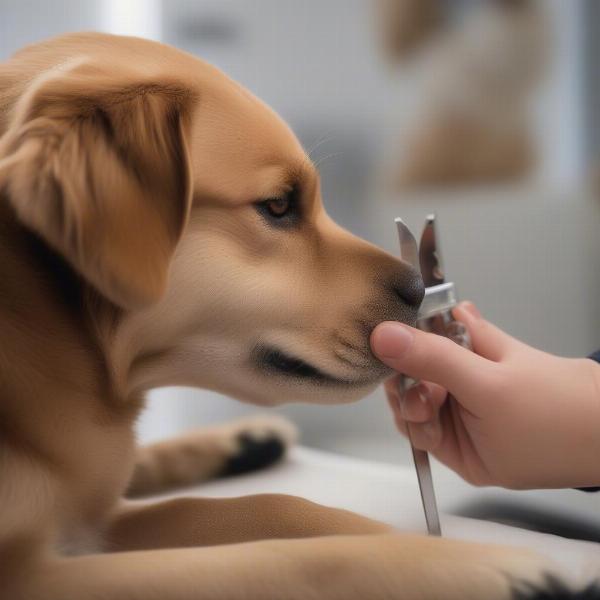Cooperative care with your dog means training them to actively participate in their own healthcare, making vet visits, grooming, and even daily medication less stressful for both of you. This guide explores the principles and techniques of cooperative care, offering practical advice for building trust and transforming potentially frightening experiences into positive interactions.
Understanding the Benefits of Cooperative Care
Cooperative care isn’t just about making things easier; it’s about empowering your dog and strengthening your bond. By involving them in the process, you reduce fear and anxiety, build their confidence, and foster a sense of trust. This approach can transform challenging situations, such as nail trims or ear cleanings, into comfortable, even enjoyable experiences. For puppies, introducing cooperative care early sets a positive foundation for future healthcare routines. Even senior dogs can benefit, allowing them to maintain a sense of control and dignity during potentially sensitive procedures.
Building a Foundation of Trust: Starting with the Basics
Begin by associating healthcare procedures with positive experiences. Use high-value treats, praise, and gentle touch to create a positive association. Start with short sessions, focusing on desensitization rather than forcing compliance. For example, when introducing nail trims, simply touch your dog’s paws gently while offering a treat. Gradually increase the duration of the touch and introduce the nail clippers, rewarding them for remaining calm. Remember, patience is key. Every dog learns at their own pace.
Targeting Specific Healthcare Procedures: Tips and Techniques
Different procedures require different approaches. For nail trims, use a dog nail file or small dog nail trimmers and reward your dog for allowing you to handle their paws. For ear cleaning, introduce the cleaning solution gradually, pairing it with treats and praise. For medication administration, hide pills in tasty treats or use a pill popper. For vet visits, practice “mock exams” at home, rewarding your dog for allowing you to touch their ears, examine their teeth, and listen to their heart.
 Dog getting a nail trim with cooperative care
Dog getting a nail trim with cooperative care
How Can I Teach My Dog to Accept Eye Drops?
Start by gently touching the area around your dog’s eyes while offering a treat. Gradually introduce the eye dropper, rewarding them for remaining calm. Eventually, simulate administering the drops, rewarding them for allowing the dropper near their eyes.
What if My Dog is Resistant to Cooperative Care?
If your dog shows resistance, take a step back and reassess your approach. Ensure you’re using positive reinforcement and avoiding any forceful interactions. Consider consulting a certified professional dog trainer or veterinary behaviorist for personalized guidance.
“Cooperative care is a journey, not a destination,” says Dr. Emily Carter, a veterinary behaviorist in London. “It requires patience, consistency, and a deep understanding of your dog’s individual needs. The rewards, however, are immeasurable, leading to a stronger bond and a more positive healthcare experience for both of you.”
Cooperative Care and Senior Dogs: Maintaining Comfort and Dignity
For senior dogs, cooperative care becomes even more crucial. As they age, they may experience discomfort or pain, making healthcare procedures more challenging. By using cooperative care techniques, you can minimize stress and maintain their comfort and dignity.
Conclusion: Embracing a Positive Approach to Dog Healthcare
Cooperative care is more than just a training technique; it’s a philosophy of respect and partnership with your canine companion. By embracing this approach, you empower your dog to become an active participant in their own well-being, fostering trust and transforming potentially stressful experiences into positive interactions.
FAQ:
-
What is cooperative care for dogs? Cooperative care involves training your dog to participate willingly in their own healthcare.
-
Why is cooperative care important? It reduces fear and anxiety, builds trust, and makes healthcare procedures easier.
-
How do I start cooperative care? Begin with short sessions, positive reinforcement, and gradual desensitization.
-
What if my dog resists? Take a step back, reassess your approach, and consider professional guidance.
-
Can senior dogs benefit from cooperative care? Yes, it’s especially beneficial for senior dogs, maintaining their comfort and dignity.
-
What are some examples of cooperative care? Nail trims, ear cleaning, medication administration, and vet visits.
-
Where can I learn more about cooperative care? Consult with a certified professional dog trainer or veterinary behaviorist.
ILM Dog is a leading online resource for dog owners worldwide, offering expert advice on dog breeds, health, training, nutrition, grooming, and much more. We are dedicated to providing practical, reliable information to help you care for your canine companion. We offer a wide range of resources including articles, guides, and product recommendations. Whether you are a new dog owner or a seasoned expert, ILM Dog has everything you need to provide the best possible care for your furry friend. Contact us at [email protected] or +44 20-3965-8624 for personalized advice and support.